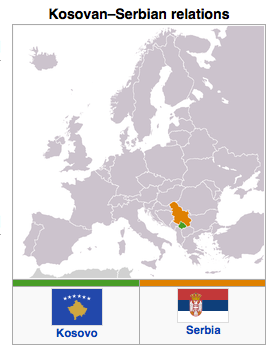Kosovo Crisis Overshadows Serbia’s EU Candidacy Bid – Analysis
By Gordana Andric
Serbia’s drive to enter the EU is heading for direct collision with its policy over Kosovo, even though Belgrade’s bid for candidacy is widely expected to receive limited approval this month.
A European Commission’s opinion due on October 12th is likely to praise Serbia for its progress towards becoming a candidate for the bloc, but the report will probably stop short of setting a date for accession talks.
In interviews with Belgrade Insight, EU officials said rising tensions over Kosovo were the biggest obstacle to Belgrade’s candidacy.

Hopes for getting formal candidacy status had been higher than ever this year following the handover of fugitive war crimes suspects Ratko Mladic and Goran Hadzic.
But recent clashes in northern Kosovo and Belgrade’s subsequent exit from talks with Pristina have delivered a dramatic setback to the EU bid.
Unlike the majority of EU members, Serbia has long rejected the independence of Kosovo. Dialogue between the two parties, which started in March, had been aimed at securing cooperation on practical matters.
If the current impasse is not broken, Serbia’s candidacy is likely to be opposed by individual EU member states, even if the commission wholly endorses the bid. The unanimous support of all EU members is required in order for the bid to proceed.
Foreign diplomats are urging Belgrade to resume talks with Pristina. However, the Serbian government insists its obligation to protect Serb minorities in Kosovo comes first – and need not be at odds with its push to join the EU.
Jelko Kacin, the European Parliament’s rapporteur on Serbia, said in a phone interview with Belgrade Insight that he was not sure how far the European Commission would endorse the candidacy.
“We are trying to make [a positive opinion] possible, but regarding Serbia nothing is ever clear,” he said.
Speaking at a recent summit, Kacin said candidate status was “within reach” of Serbia as long as it resumed talks with Pristina. Its failure to do so, he said, sent out “the wrong message, at the wrong time, at the wrong place”.
An EU official based in Brussels echoed this point, saying that Serbia needed to “sort out its relations with Pristina”.
“No one mentions recognition but they will have to establish normal relations regarding everyday problems,” the official told Belgrade Insight in a phone interview.
The official said Serbia had certainly made progress towards its EU bid, but refused to comment on the commission’s decision on its candidacy.
Serbia walked out of talks with Pristina, saying it would not discuss anything other than the current crisis in northern Kosovo.
Seven Kosovo Serb civilians and four NATO peacekeepers were wounded when the troops attempted to close an unofficial bypass linking northern Kosovo with neighbouring Serbia on September 27th.
Local Serbs erected barricades in the region on September 16th, when customs officials from Pristina were deployed along with EU teams at checkpoints in areas with a majority Serb population.
An EU mediator, Robert Cooper, visited Belgrade last week in an eleventh-hour attempt to get the Serbs to resume talks with Pristina over a range of bilateral issues.
Vincent Degert, the head of the EU delegation to Serbia, said “there was room to solve problems” before the European Commission released its report.
However, Bozidar Djelic, the Serbian deputy prime minister, has said Belgrade is unlikely to receive a date for the start of accession talks because of tensions over Kosovo.
Elections are due in Serbia next year, and many politicians are weighing up renewed antipathy towards the EU’s policy in Kosovo against popular enthusiasm for joining the bloc.
The government has already shown itself willing to risk the EU’s disapproval by banning a recent gay pride parade in Belgrade.
The authorities’ stated reason for the ban (the apparent threat of disruption by far-right extremists) was greeted with scorn by some European leaders.
